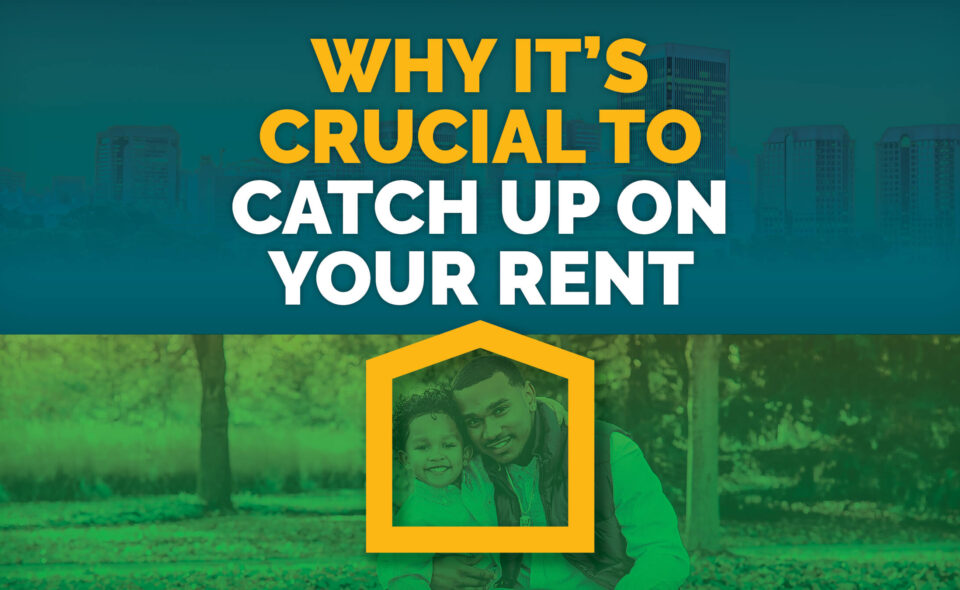Paying rent means staying housed and creating a secure future for you and your family. Falling behind can lead to the loss of your current housing and keep you from taking advantage of future opportunities.
If you are behind on your rent, you’re not alone. RRHA can help you get back on track.
A repayment agreement gives you a sustainable way to pay off your balance over time—while you stay in your home. RRHA will offer a repayment agreement for every kind of tenant debt, including rent, utilities, late penalties, or other miscellaneous charges.
The first step is simple.
Schedule a financial counseling meeting as soon as possible with your management office. At the meeting, we will help you assess your account, connect you with valuable free resources, and put a plan in place to come current.
Why it’s crucial to catch up on your payments
Avoid lease enforcement.
When you sign your lease, you agree to fulfill its obligations and comply with the rules. We hope it will never come up, but you could have your lease terminated. The most common reason for lease enforcement is failure to pay rent.
A family who signs a repayment agreement is considered in “good standing” and no legal action will be taken so long as you make payments in accordance with the agreement.
Make a repayment plan as soon as possible to avoid legal action and keep your housing.
Become eligible for a housing voucher.
The Housing Choice Voucher Program (formerly “Section 8”) allows low-income families to live in specific properties or privately-owned homes with subsidized rent.
To qualify for a voucher, federal HUD regulations require you to be current on your rent. If you are selected off an HCV waitlist but owe rent, you won’t be able to claim the voucher.
All of RRHA’s Big 6 communities will be redeveloped, and residents will be rehoused using these vouchers. Your eligibility for the voucher matters! We want to make sure that as many of our families as possible are eligible for this high-demand program.
Residents with repayment agreements in good standing can be admitted into RRHA’s Housing Choice Voucher Program.
Qualify for homeownership opportunities.
Pre-qualification criteria for RRHA’s transformational new homeownership initiative includes a positive rental payment history. To be eligible for this new program you must be able to prove a consistent rental payment history of at least 2 years. This means the rent has been paid on or before the due date every month for the last two years. The sooner you get on track, the sooner you can achieve this milestone.
When you own your own home, you can:
- Control your monthly housing payment
- Use home equity to build wealth
- Make the home your own
- Gain a sense of belonging in your community
- Increase your financial strength
- Earn tax deductions
Make it easier to move in the future.
If you move and have not paid all the rent that you owe, you won’t be eligible for public housing in another jurisdiction. All public housing authorities must enforce this federal regulation and deny any applicant who owes rent to another housing authority.
Nonpayment can also impact your rental history and thus your ability to rent outside of public housing. If a potential landlord calls, RRHA can’t give a positive reference for a former tenant who owes money.
When you come current, you can avoid these issues and move more easily in the future.
Improve your credit score.
If nonpayment results in legal action (“unlawful detainer”), a judgment against you will appear on credit reports.
A low credit score can hurt your chances of being able to rent property in the future or increase the amount of rent you are charged. The good news is that coming current on your rent can improve your credit score and ultimately save you money.
Learn more about why credit scores are important to your financial health from the Federal Trade Commission.
Strengthen your community.
For RRHA to continue to provide safe and decent housing for our families, we must have the funds to do so. Paying your rent is a responsibility and obligation that makes our partnership work.
Set the right example.
Your family looks to you to do the right thing. Honoring your rental agreement sets the right example for them.
We know you can catch up, and we’re here to help you do it.
What to do if you’re behind on rent?
Our goal is to ensure that our families are in the best possible position. Our counseling and repayment plans exist to help avoid a situation in which you are subject to lease enforcement action.
Get back on track with a repayment plan and free resources.
It all begins with a financial consulting session with your Property Manager.
Your Property Manager may offer other solutions specific to your situation, and they will put you in touch with free resources that range from budgeting, employment assistance, and free or nearly-free childcare. These resources may include:
Budgeting assistance
Richmond Financial Navigator Program, Humankind Richmond, United Way of Greater Richmond & Petersburg, and Southside Community Development Center Financial Opportunity Center
Employment assistance
Office of Community Wealth Building, Caliper Staffing, Humankind Richmond, and Virginia Career Works
Childcare resources
Peter Paul Development Center and YMCA of Greater Richmond
Quick facts about repayment agreements
- Signing a repayment agreement is an option for any RRHA public housing family who owes past rent, as long as they have not defaulted on a current repayment agreement.
- RRHA will offer a repayment agreement for every kind of tenant debt, including rent, utilities, late penalties, or other miscellaneous charges.
- The plan adds up to 10% of the owed balance to the household’s monthly rent until the family is current. Monthly payments are capped at 10% of the family’s monthly adjusted income.
- No down payment will be required for the repayment agreement.
- Each repayment agreement has its own individual deadline. Because the repayment plan is income-based, repayment will take as long as each individual family needs to resolve the debt.
- If one monthly payment is missed, it will be added back to the tenant’s active ledger. This will not impact the rest of the repayment balance.
- If two (2) or more consecutive payments of the repayment agreement are missed during any 12-month period, RRHA may terminate the agreement.
The best time to start getting back on track is right now!
Management Offices
Call or visit your management office as soon as possible.
Property Managers
Find your Property Manager in the RRHA Employee Directory.

